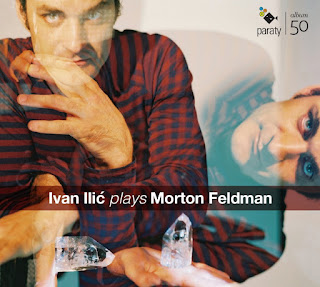Morton Feldman For Bunita Marcus; Ivan Ilic; Paraty
Reviewed by Robert Hugill on Nov 11 2015
Star rating:
Mesmerising, intense and very quiet; Ivan Ilic really makes you want to listen
On this new disc on the Paraty label (distributed by Harmonia Mundi) the Serbian-American pianist Ivan Ilic has recorded Morton Feldman's long piano piece, For Bunita Marcus. Written in 1985, For Bunita Marcus comes almost at the end of Feldman's long list of piano works and the dedicatee, Bunita Marcus would commission and premiered his last piano piece Palais de Mari (1986). Bunita Marcus was a student of Feldman's from 1975 to 1981 at the University of Buffalo and would go on to be his intimate companion until his death.
Reviewed by Robert Hugill on Nov 11 2015
Star rating:
Mesmerising, intense and very quiet; Ivan Ilic really makes you want to listen
On this new disc on the Paraty label (distributed by Harmonia Mundi) the Serbian-American pianist Ivan Ilic has recorded Morton Feldman's long piano piece, For Bunita Marcus. Written in 1985, For Bunita Marcus comes almost at the end of Feldman's long list of piano works and the dedicatee, Bunita Marcus would commission and premiered his last piano piece Palais de Mari (1986). Bunita Marcus was a student of Feldman's from 1975 to 1981 at the University of Buffalo and would go on to be his intimate companion until his death.
This disc is the third part of Ivan Ilic's Morton Feldman Trilogy. The first part, the CD The Transcendentalist juxtaposes Scriabin miniatures with music by Feldman, Cage and Scott Wollschleger. The second part, Detours Which Have To Be Investigated is a book, CD and DVD. Ilic has clearly invested a lot of time and thought in Feldman's music and this clearly pays off in his performance of the long For Bunita Marcus.
Feldman's music is obsessive, repetitive and largely quiet. He nags away at the same group of notes until he has extracted the last essence from them before moving on. Though Feldman's music is often linked to that of the minimalists, he does not use the same sort of process mechanism on which minimal music is based. Instead his note patterns seem to have been purely instinctive. There is often a sense of floating in space in the notes, each one there to be enjoyed on its own and tempting the listener to hear it in relation to the others.
In his own introduction to the piece which is included on the Universal Edition website (and it is well worth looking at) Feldman talks about how his primary interest in the work was rhythm and metre and at the start of the article he makes the cryptic comment that 'for me rhythm does not exist'. In this work he uses mainly bars of 3/8, 5/16 and 2/2 (the latter for punctuation I think), and then develops his ideas metrically. This explains the extraordinary fluidity of the piece, something which Ilic brings out.
This is music which requires concentration and Ivan Ilic includes a fine article in the CD booklet entitled Listening to 'For Bunita Marcus' in which he explains his thoughts about the music and how to listen to it. He quotes Cornelius Cardew in the article:
'Almost all Feldman's music is slow and soft... I see it as a narrow door, to whose dimensions one has to adapt oneself (as in 'Alice in Wonderland')... Only when one has become accustomed to the dimness of light can one being to perceive the richness and variety of colour'
Ivan Ilic's performance is notable for the fluidity of performance and the almost magical control that he has on the intensity and colour of the music. Over a span of 68 minutes he weaves a web of transcendence. The piano is recorded quite closely so that we seem almost inside it, giving an added aura of resonance to the music.
This disc will not be for everyone, but For Bunita Marcus is a work to be listened to intently and quietly and in Ivan Ilic's performance he really makes us want to listen.
Morton Feldman (1926-1987) - For Bunita Marcus (1985) [68:02]
Ivan Ilic (piano)
Recorded September/November 2014 at the Salle Cortot in Paris.
Elsewhere on this blog:
- Comic, unnerving: Biedermann & the Arsonists - opera review
- Loquebantur: Music from the Baldwin Part Books - CD review
- Relax and be charmed: Rameau's Anacreon - CD review
- Amazing fecundity: Purcell's Twelve Sonatas in Three Parts - CD review
- Musicology, Performance and Manuscripts: My encounter with David Skinner, artistic director of Alamire - interview
- Intelligent performances: Lucy Hall & Gavin Roberts at London Song Festival - concert review
- A Forza for our times: The Force of Destiny at ENO - Opera review
- Thrilling evening: Quinn Kelsey at Rosenblatt Recitals - concert review
- Ecletic Baltic: Mr McFall's Chamber - Solitudes - CD review
- Music from a Tudor court: Anne Boleyn's Songbook from Alamire - CD review
- Somewhat disappointing evening: Handel's Tamerlano at the Barbican - Opera review
- Wit and imagination: Francesca Caccini's opera at BREMF - opera review
- Triple Portrait: Chamber music by Elena Firsova - CD review
- Home












No comments:
Post a Comment